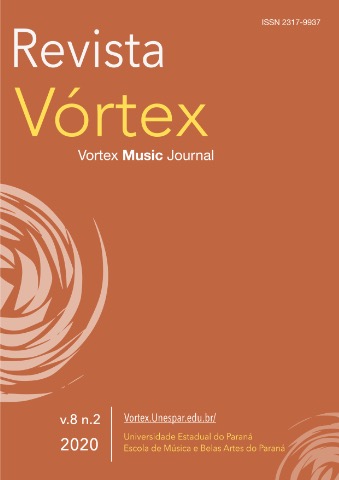Occupied reflections: audience as performers
DOI:
https://doi.org/10.33871/23179937.2020.8.2.1Palavras-chave:
New music, Composition, Toy piano, Audience, PerformanceResumo
New music is often perceived as challenging, and many times generates controversial opinions. Nevertheless, it allows for some non-obvious relationships between composers, performers, and listeners. Finding more effective ways to engage listeners into new music could be an alternative way to reach out to further audiences. This paper aims to discuss and give examples of how the audience was integrated as a performer in a new music performance, more specifically in the piece "occupied mirrors" , for toy piano and audience (composed by the author of the paper). The piece was thought through and planned in such a way that it invited the audience to become active performers, part of the musical plot as music makers. Conclusions suggest that what was asked from the audience opened up a unique new music experience, as they had to follow instructions and actively participate in the construction of the sound.Downloads
Referências
CARVALHO, Sara; MARINHO, Helena. Ritual and transgression: A Case Study in New Music. E-Cadernos, Centro de Estudos Sociais da Universidade de Coimbra, n.8, pp.108–120, 2010. Available at: <http://www.ces.uc.pt/e-cadernos/media/ecadernos8/07 - Sara Carvalho e Helena Marinho 12.04.11 FINAL.pdf>. Accessed on: 30 April 2019.
COOK, Nicholas. Between Process and Product: Music and/as Performance. Music Theory Online, v.7, n.2, 2001.
DE HANN, Simone. The Relationship between the Composer, Performer and Listener in Twentieth Century Music-Making - Inaugural professorial lecture. Griffith University, Queensland, Australia, 1988. Available at: <http://hdl.handle.net/10072/368708>. Accessed on: 2 May 2019.
LOFFREDO, Antonietta. The Toy Piano. Bologna: Ut Orpheus, 2018.
MEYER, Leonard. Emotion and Meaning in Music. Chicago: University of Chicago Press, 1956.
KENDALL, Roger; CARTERETTE, Edward. The Communication of Musical Expression. Music Perception v.8, n.2, pp.129–163, 1990.
SERAFINE, Mary Louise. Music as Cognition: The Development of Thought in Sound. Columbia University Press, New York, 1988.
WAYMAN, Virginia. The meaning of the music education experience to middle school general music students. Dissertation (Doctor of Philosophy with a Major in Music). Faculty of the School of Music and Dance, University of Arizona, 2005. Available at: <https://docplayer.net/41698818-The-meaning-of-the-music-education-experience-to-middle-school-general-music-students-virginia-elaine-wayman.html>. Accessed on: 29 April 2019.
Downloads
Publicado
Como Citar
Edição
Seção
Licença
Copyright (c) 2021 Sara Carvalho

Este trabalho está licenciado sob uma licença Creative Commons Attribution 4.0 International License.
Autores mantêm os direitos autorais e concedem à revista o direito de primeira publicação, com o trabalho simultaneamente licenciado sob a Licença Creative Commons Attribution que permite o compartilhamento do trabalho com reconhecimento da autoria e publicação inicial nesta revista.






